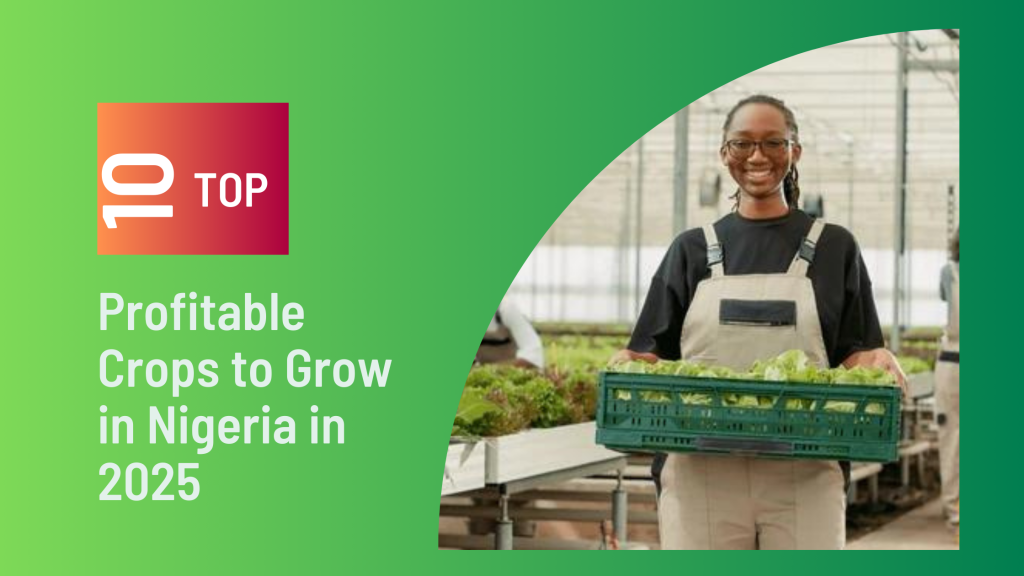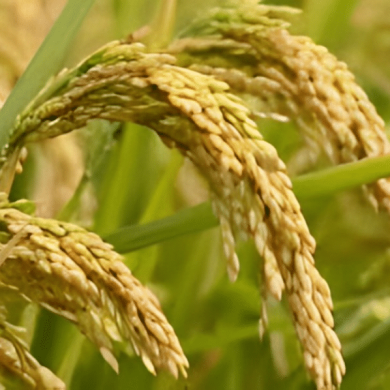Top 10 Profitable Crops to Grow in Nigeria in 2025

Nigeria’s agricultural sector offers immense opportunities for farmers and agripreneurs looking to cultivate crops with high returns on investment. With the growing demand for food and export products, choosing the right crops can make all the difference. In this guide, we outline the top 10 profitable crops to grow in Nigeria in 2025, focusing on sustainable practices and market trends.
Why Choose Profitable Crops in Nigeria?
Selecting profitable crops helps farmers maximize their income while contributing to food security. By leveraging Nigeria’s diverse climate zones and fertile soil, farmers can grow a variety of crops tailored to local and international markets.
Top 10 Profitable Crops to Grow in Nigeria in 2025
1. Cassava
Cassava remains one of Nigeria’s most cultivated crops due to its versatility and high demand for products like garri, fufu, and tapioca. With its ability to thrive in different soil types, cassava offers reliable yields.
Tips for Success:
- Use improved cassava varieties to boost yield.
- Adopt mechanization for planting and harvesting.
2. Rice
Rice cultivation is a profitable venture as Nigeria strives to reduce its import dependency. Locally grown rice commands high market value.
Tips for Success:
- Focus on irrigated rice farming for consistent yields.
- Partner with rice millers for processing and packaging.
3. Maize (Corn)
Maize is a staple food in Nigeria, used in various forms such as pap, flour, and animal feed. Its short growing cycle makes it ideal for multiple harvests in a year.
Tips for Success:
- Apply nitrogen-based fertilizers to enhance growth.
- Rotate maize with legumes to maintain soil fertility.
4. Soybeans
Soybeans are in high demand due to their use in animal feed, soybean oil, and soymilk production. They’re also a great source of protein.
Tips for Success:
- Use inoculants to improve nitrogen fixation.
- Target both local and international markets.
5. Tomatoes
Tomatoes are a lucrative crop with high demand for fresh consumption and processing into a paste. Greenhouse farming enhances year-round cultivation.
Tips for Success:
- Invest in disease-resistant varieties.
- Use drip irrigation for water efficiency.
6. Yam
Yam is a staple food with cultural significance in Nigeria. The demand for yam exports is also increasing, making it a profitable crop.
Tips for Success:
- Use seed yams from reputable sources.
- Practice mound or ridge planting for better yields.
7. Pepper
Hot peppers, such as habanero and chili, are widely used in Nigerian cuisine. The export market for peppers is also expanding.
Tips for Success:
- Ensure adequate spacing to reduce disease spread.
- Use organic fertilizers to enhance flavor.
8. Plantain
Plantain farming is lucrative due to its high consumption rate in Nigeria. It requires minimal inputs and thrives in humid climates.
Tips for Success:
- Intercrop with other crops like cocoyam to maximize land use.
- Practice mulching to retain soil moisture.
9. Groundnuts (Peanuts)
Groundnuts are versatile crops used in oil production, snacks, and animal feed. They’re suitable for both subsistence and commercial farming.
Tips for Success:
- Use pest-resistant varieties.
- Harvest early to prevent aflatoxin contamination.
10. Moringa
Moringa is gaining popularity for its nutritional and medicinal benefits. Its leaves, seeds, and oil are in high demand globally.
Tips for Success:
- Invest in value-added products like moringa powder.
- Target export markets for better returns.
Conclusion
Farming in Nigeria presents endless possibilities for profitability and growth, especially when focusing on high-demand crops. By leveraging modern farming practices and targeting both local and international markets, farmers can unlock the potential of these crops in 2025.






Add comment
You must be logged in to post a comment.